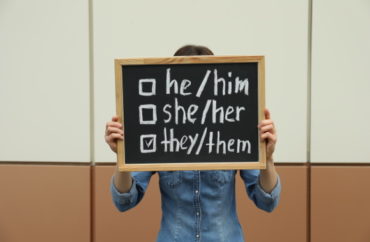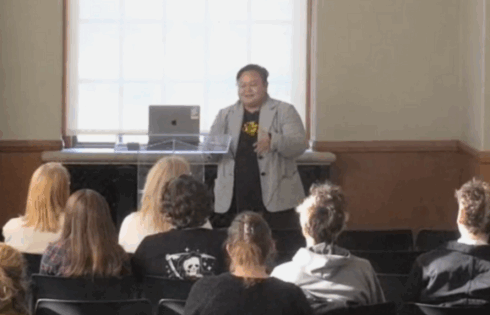
Brandeis University faculty most likely to list pronouns
The practice of listing personal pronouns on one’s professional webpage varies by university and program, with women’s studies professors most likely to list pronouns and physics professors least likely, according to an analysis by journalist Chris Brunet.
Brunet retrieved data from 16 departments at the “top” 100 American universities (identified by QS World University Rankings) to determine the prevalence, by school and department, of faculty listing personal pronouns such as “she/her/hers” or “they/theirs/them” for the 2022-23 academic year.
His analysis included a scan of the department page for each tenured and tenure-track professor in the department.
Seventy-seven percent of the schools surveyed had “no faculty whatsoever” who listed pronouns.
Pronoun listing was most prevalent at Brandeis University, where 12 percent of faculty listed pronouns. Other top universities with a high percentage of pronoun listings included University of California Santa Cruz and Harvard University, according to the analysis.
University of Iowa and University of Pennsylvania had no faculty pages with pronouns listed.
Women’s studies had the highest use of pronouns by department, with biology and computer science closely following.
Physics was the only department surveyed with no faculty pages listing pronouns, according to the analysis.
Other departments with low pronoun usage included chemistry (99 percent did not list pronouns) and music (99 percent unlisted).
Brunet did not respond to three messages sent to his Twitter account in the past month that asked for further comment.
Ethicist criticizes use of personal pronouns
An ethicist criticized the prevalence of pronouns, which he said asks students to lie.
“Students are being made to repeat things that they know are false,” Nathanael Blake, a fellow at the Ethics and Public Policy Center, told The College Fix via email.
“The mission of education, in particular, the sciences, that relied on observable facts, now has scientists saying to go along with falsehood. It calls into question the integrity of the entire scientific community,” he said.
Blake said that Brunet’s research has limitations but is a good start at studying gender ideology’s effect on higher education.
“I think that this was an interesting attempt to quantify the spread of pronoun use at top universities. Unfortunately, it does have a lot of limitations (many of which the author noted) and therefore is more a sighting shot,” Blake said. “I would be hesitant to draw strong conclusions from it. However, I think it is a good first step in the study of how gender ideology is being implemented.”
Using the wrong pronouns in some circumstances is legally ‘family violence,’ author said
Brunet referenced several news stories of individuals facing legal charges for failing to identify individuals by their chosen pronouns in his analysis as evidence for why this issue matters.
“This story hits close to home for me because in Canada using the wrong pronoun for your child is the equivalent of family violence… you can and will go to jail for this, and you will never see your child again. I therefore can’t consider starting a family in Canada,” according to Brunet.
“So no, I don’t think it is frivolous/silly/clickbait/alarmist culture wars stuff. This is a gravely serious issue to me,” he wrote.
MORE: Here’s why asking for pronouns is like a religious test
IMAGE: New Africa/Shutterstock
Like The College Fix on Facebook / Follow us on Twitter






Please join the conversation about our stories on Facebook, Twitter, Instagram, Reddit, MeWe, Rumble, Gab, Minds and Gettr.